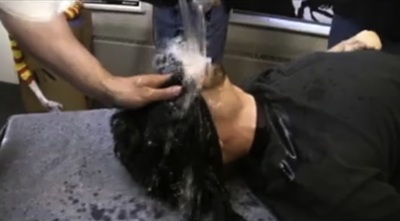
There have been calls for a full investigation into cases of torture, including waterboarding, by members of the RUC and British army in Ireland during the 1970s.
The use of torture by the British Crown forces has been documented since at least 1971, when sensory deprivation and other experimental tortures were developed by the British Army.
At the height of the conflict, scores of IRA Volunteers and innocent civilians were subjected to intense physical and psychological violence at Castlereagh interrogation centre, which was known to nationalists as Castlereagh torture centre.
A new BBC television documentary has confirmed that the near-drowning technique known as ‘waterboarding’ was developed in Belfast 40 years ago by the British Army. The RUC police also used the technique extensively, it said.
Amnesty International has now alled for a criminal investigation into what it said were serious allegations that the abuses continued long after they were exposed and disowned.
The organisation, which has come under pressure to take a stand on the ongoing abuses of Irish political prisoners at Maghaberry and the case of internee Marian Price, warned this week “that sections of the security forces in Northern Ireland may have continued this criminal activity”.
“Torture is a crime under national or international law. If anyone carries out a crime, they should be held accountable for that before the law. To date, no-one has been held properly accountable for such torture.
“Such human rights violations should also be subject to a wider inquiry into the past in Northern Ireland. We must learn the lessons of our painful past, including that the use of torture should forever be placed beyond the limits of acceptability for the police and armed forces.”
DEATH SENTENCE
Among the cases highlighted by the documentary was that of Liam Holden, who was 19 years old when members of the British Army’s Parachute Regiment took him to their base on the Black Mountain in Belfast, where they accused him of killing a soldier.
They threatened to shoot him and then used another interrogation technique not known to have been used in Ireland at the time.
“They got the bucket of water and they just slowly but surely poured the bucket of water right round the facial area, over my nose and mouth,” Mr Holden told film-makers.
“It was like pouring a kettle of water, like pouring your tea into a cup out of the kettle, that sort of speed, basically until I passed out or close to passed out.”
After several hours of interrogation, Mr Holden confessed to the attack.
He later gave his trial in Belfast Crown Court a detailed account of the torture, but this was ignored and he became the last person in Ireland or Britain to be sentenced to death.
He then spent four weeks in the condemned man’s cell at Crumlin Road jail in Belfast, not knowing if each morning would be his last, before his sentence was commuted to life in prison.
Mr Holden then spent 17 years in prison before his conviction was quashed by the Court of Appeal earlier this year.
‘HELL AND BACK’
Féilim Ó hAdhmaill was subjected to a similar interrogation technique in an attempt to force him to confess to IRA activities.
Now a lecturer at Cork University, he was interrogated in 1978 by RUC ‘detectives’ at Castlereagh.
“Somebody produced a towel, or what looked like a towel, and put this towel over my head and over my nose and mouth region and twisted it at the back and pulled my head down while they were holding my limbs,” he said.
“Somebody poured water over my nose and mouth region and they were shouting ‘breathe it in’. It was terrifying if I am truthful......at that time I thought they were actually going to kill me.”
Veteran republican Kevin Hannaway was one of the ‘Hooded Men’ who were selected for what the British Army termed “deep interrogation”.
They were hooded, beaten and then subjected to what were called the five techniques, which included food and sleep deprivation and being subjected to very loud noise for long periods.
He recalls how he was thrown out of a helicopter into a compound where he was bitten by dogs before being beaten and ‘interrogated’ for 12 days.
“I don’t think there’s any words that could describe what we 14 men went through,” he said. “If there’s a hell I would say the other 13 men and I have been there and back again.”
In 1976, the European Commission ruled that the British government was guilty of both torture and inhumane and degrading treatment.
However, on appeal, British lawyers controversially succeeded in having the ‘torture’ element of the ruling rescinded, allowing those involved to escape criminal investigations and continue their abuses.
![[Irish Republican News]](https://republican-news.org/graphics/title_gifs/rn.gif)
![[Irish Republican News]](https://republican-news.org/graphics/title_gifs/harp.gif)

